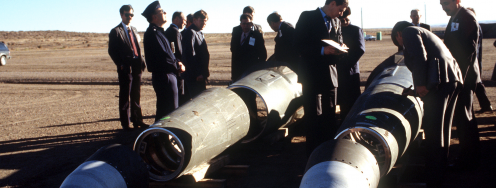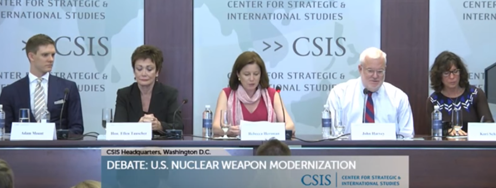UK Trident Review Shows Political Rift Over Nuclear Weapons
On the radar: Trident alternatives, costs and politics; Happy 68th birthday, nuclear weapons; Opportunity with Iran; Treaty compliance; UPF cost hikes; and Saudi Arabia’s missile dyad.
On the radar: Trident alternatives, costs and politics; Happy 68th birthday, nuclear weapons; Opportunity with Iran; Treaty compliance; UPF cost hikes; and Saudi Arabia’s missile dyad.
July 16, 2013 | Edited by Benjamin Loehrke
Trident review - The UK released its review of its Trident nuclear submarines and alternatives to the multi-billion pound plan for replacing them. Key points from the summary: “The analysis has shown that there are alternatives to Trident that would enable the UK to be capable of inflicting significant damage such that most potential adversaries around the world would be deterred. It also shows that there are alternative non-continuous postures...that could be adopted”
--”The costs of delivering an alternative system could theoretically have been cheaper than procuring a like-for-like renewal of Trident were it not for timing and the fact that the UK deterrent infrastructure is finely tuned to support a submarine-based Trident system. In particular, the time it would take to develop a new warhead (itself a costly and high risk exercise) is judged to be longer than the current Vanguard-class submarines can safely be Trident Alternatives Review 11 operated. Bridging the resulting gap in deterrence capability would involve procuring two Successor SSBNs so that a Trident-based deterrent remains available until at least 2040. Doing that at the same time as investing in the development of a new warhead, new missile, new platform and new infrastructure means that transitioning to any of the realistic alternative systems is now more expensive than a 3 or 4-boat Successor SSBN fleet.”
--Full Report: ”Trident Alternatives Review” July 16, 2013. (pdf) http://bit.ly/1dCk5R2
Nuclear politics - "We have a big decision to make in 2016, and this study shows there are credible alternatives that don't compromise our security but do allow us to move on from the Cold War...We can adapt our nuclear deterrents to the threats in the 21st century by ending 24-hour patrols when we don't need them and buying fewer submarines," said Liberal Democrat Danny Alexander. Nicholas Winning at The Wall Street Journal has the quote. http://on.wsj.com/18j6cGP
--"We do not believe that, with nuclear threats if anything proliferating, with more countries seeking to get nuclear weapons, this is the time to downgrade," said Conservative Defence Minister Philip Hammond of the Trident review’s proposals. Reuters has the quote. http://reut.rs/12DkbXc
Tweet - @ctbto_alerts: 68 yrs ago today: Trinity #nuclear test, 1st of 2054 to shake & irradiate the planet. #CTBT bans all nuke testing. http://t.co/0JBPEU546J
Tweet - @BulletinAtomic: Slideshow: 68th Anniversary of the Trinity Bomb Test @slashdot http://t.co/LlfgIO0m0v
Welcome to Early Warning - Subscribe to our morning email or follow us on twitter.
--Have a tip or feedback for the editor? Email earlywarning@ploughshares.org earlywarning@ploughshares.org. Want to support this work? Click here.
Diplomacy opportunity - "We strongly encourage your administration to seize the moment to pursue new multilateral and bilateral negotiations with Iran once Rowhani takes office and to avoid any provocative action that could narrow the window of opportunity for a more moderate policy out of Tehran,” write 29 former U.S. officials in a new letter to President Obama. Signatories include Amb. Thomas Pickering, Anne-Marie Slaughter and Larry Wilkerson. AFP has the story. http://bit.ly/18lt5wQ
Compliance report - A recent intelligence assessment “flatly refutes claims of Russian noncompliance, asserting that Moscow does not “produce or retain” any weapons systems banned under the INF Treaty. Similarly, the State Department’s 2013 Arms Control Compliance Report, released on July 12, does not contain any allegations suggesting that Russia is failing to observe the terms of the treaty. Therefore, fears that Moscow has been surreptitiously amassing an arsenal of banned missiles appear to be unfounded,” writes Kingston Reif at Nukes of Hazard. http://bit.ly/13MKb52
--Read the reports: “Ballistic and Cruise Missile Threat” by the National Air and Space Intelligence Center. (pdf) http://1.usa.gov/10Ymin2
--”Adherence to and Compliance with Arms Control, Nonproliferation and Disarmament Agreements and Commitments” by the State Department. July 2013. (pdf) http://1.usa.gov/12uaGpE
What’s going on? - “Arms control critics frequently charge that the Russians are violating previous agreements. Often these charges are made with little or weak evidence, as with the current claim that Russia has violated the 1987 Intermediate-Range Nuclear Forces (INF) Treaty. On examination, this claim has no basis,” writes Steven Pifer for Brookings. Full blog here. http://bit.ly/16GD2Ov
--See also: ”No Evidence of INF Treaty Violation in 2013 Compliance Report” by Greg Thielmann in Arms Control Now. http://bit.ly/13gxRXG
UPF cost increases - “Overly optimistic National Nuclear Security Administration (NNSA) assumptions about the Uranium Processing Facility (UPF) contained in multiple cost estimates prepared from 2004 to 2011 (upper bound of cost range was approximately $1.1 billion and $6.5 billion, respectively) are the primary factors that contributed to its cost increase,” writes the Government Accountability Office in a new report.
--Full report: “Nuclear Weapons: Factors Leading to Cost Increases with the Uranium Processing Facility” July 12, 2013. (pdf) http://1.usa.gov/12STnhQ
Saudi dyad - Saudi Arabia has quietly acquired a “strategic dyad” of conventionally armed ballistic and cruise missiles, according to a new article by Sean O’Connor in Jane’s. “While I don’t think Saudi Arabia is going nuclear in the near future, the acquisition of strategic ballistic and cruise missiles is a pretty interesting development,” writes Jeffrey Lewis in a summary of the story at Arms Control Wonk. http://bit.ly/13MN9GM
Speed reads -
--”The Wheel of Alarm on Iran” by Paul Pillar in The National Interest. http://bit.ly/18j4RzX
--”Air Force Begins Massive B-52 Overhaul” by Kris Osborn in DoD Buzz. http://bit.ly/12GM2B6
--”$100 Billion Later, Missile Defense Men Are Still Crying Poor” by John Reed at Killer Apps. http://atfp.co/16GznQX
--”In a Post-Cold War World, Uncertainty Surrounds Nuclear Triad” by Valerie Insinna and Dan Parsons in National Defense. http://bit.ly/190Pz5J
Events:
--68th Anniversary of the Trinity nuclear test. July 16th.
--”Nuclear Deterrence, Arms Control, Missile Defense and American Security Policy.” Breakfast talk with James Miller, Deputy Defense Secretary for Policy. July 17th at 8:00am at the Capitol Hill Club. http://conta.cc/16GEocb
--Senate Appropriations Subcommittee on Defense, hearing on the Missile Defense Agency budget with Director Vice Adm. James Syring. July 17th at 9:00am. http://1.usa.gov/13MKYTz
--”Contemporary Role of US Nuclear Weapons” Luncheon talk with Barry Blechman and Robert Butterworth, part of the Peter Huessy Breakfast Series. July 25th from 12:30-1:30pm at the Capitol Hill Club. RSVP here. http://conta.cc/149kH0N



